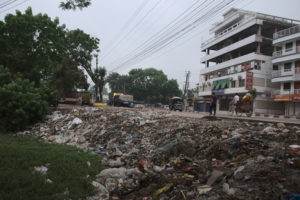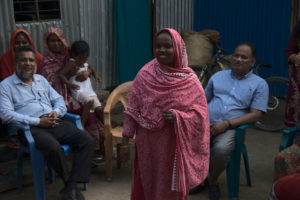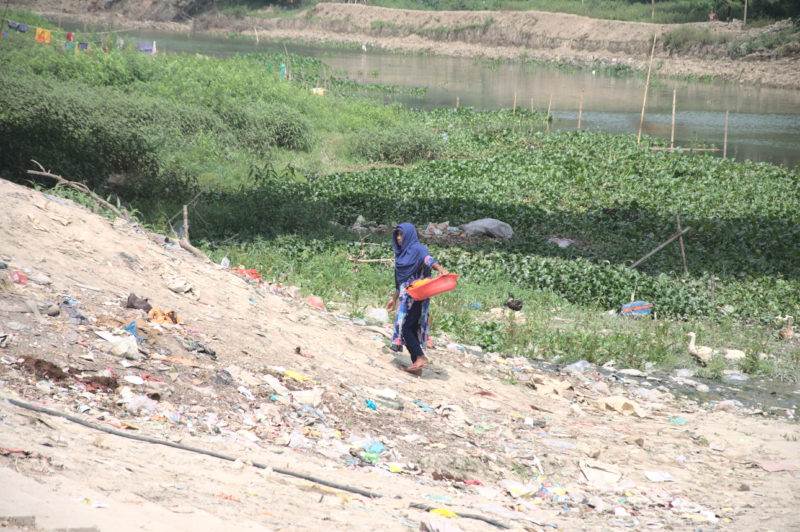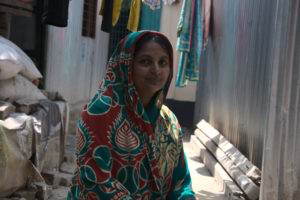At Practical Action, we’re putting ingenious ideas to work. In the city of Faridpur, Bangladesh, we’re working with informal waste workers to transform the processing of different forms of waste.
Faridpur’s citizens and authorities lack the funds to manage the city’s waste. Household waste, plastics and the contents of people’s toilets are dumped illegally, polluting the city, the rivers and the sea.
But with a little ingenuity, the city’s informal waste workers can pioneer new solutions to clean up Faridpur and convert waste into wealth. It’s a holistic approach with the potential not just to clean up the streets of Faridpur, but other cities around the world, – as well as lessening the amount of plastic waste in the world’s oceans.
This is the first of two blog posts exploring waste management in Faridpur. In this post we explore the challenges faced by the city’s residents and how these relate to the wider global challenges of climate change, urban migration and the waste crisis.
The world’s growing waste crisis
Bangladesh is one of the most densely populated countries in the world. Every year, around 5% of the country’s rural population migrates to urban centres. Faridpur is home to nearly 560,000 people and the population is increasing.
The Municipality (local government) is tasked with providing waste collection and processing services in Faridpur. As the city grows, the meagre budget allocated to waste management remains static, so the task gets ever harder. The waste that is collected by the authority from more affluent areas of the city is often not treated but dumped on open land on the outskirts.
Informal waste workers step in to fill the gaps in waste service provision, emptying toilet pits for a small fee or collecting plastic from the streets and selling it to recycling businesses. Although this provides a vital source of income for workers who are often from low-income settlements themselves, these informal workers lack protective equipment and up-to-date tools to do their jobs safely, as well as facing discrimination and abuse.
These challenges aren’t unique to Faridpur – the same difficulties are being faced by people living and working in cities across Bangladesh and around the world.
The impact on people and planet
Waste that’s not disposed of properly causes damage to people’s health and the environment. People in the poorest communities are most at risk from pollution and risk of disease, despite contributing least to the problem. Waste workers face even more impacts due to the dangerous, unhygienic nature of their poorly regulated jobs. There are knock-on effects for the planet further from home as plastic waste doesn’t biodegrade, and makes its way to the sea, where it’s almost impossible to retrieve.
Environmental degradation
Untreated waste can find its way into animal food, poisoning livestock. It seeps into the soil and causes degradation of soil quality and biodiversity. As well as damaging the environment directly, this also makes farming more challenging. Farmers turn to chemical fertilisers to boost their harvests, but this short-term solution leads to greater soil degradation in the long-term. Farmland becomes barren and farming unprofitable, prompting more people in rural areas to migrate to the city.
An ocean of plastic
Waste plastic can take 450 years to fully decompose. Much plastic waste eventually ends up in the sea, where constant motion causes it to break down into tiny particles, known as ‘microplastics’. These disperse even farther and deeper into the ocean, where they invade more habitats and become effectively impossible to retrieve.
“The (Padma) river is being eroded and displaced people are coming here. Climate change is putting pressure on farmers because it’s causing extra rainfall, sudden floods and droughts – this is the push factor. The pull factor is economic – including education and health – people are coming here for a better life for their family.”
Shahjahan Miah, Chief Executive Officer, Faridpur Municipality

A common sight in Faridpur – non-biodegradable plastic waste and degradable organic waste dumped illegally by the roadside.
Many people in Faridpur are poor, living in informal settlements (urban ‘slums’) and living from day to day. Unlike more affluent areas, informal settlements have little to no formal urban services. This means residents do not have adequate collection of household waste or emptying of their toilet pits (which is required as they are not connected to a sewer network). Without any means of disposing of their waste properly, communities are left with little choice but to dump the contents of their septic tanks and bins illegally, often in rivers.
The Municipality (local government) is tasked with providing waste collection and processing services in Faridpur. As the city grows, the meagre budget allocated to waste management remains static, so the task gets ever harder. The waste that is collected by the authority from more affluent areas of the city is often not treated but dumped on open land on the outskirts.
Informal waste workers step in to fill the gaps in waste service provision, emptying toilet pits for a small fee or collecting plastic from the streets and selling it to recycling businesses. Although this provides a vital source of income for workers, who are often from low-income settlements themselves, these informal workers lack protective equipment and up-to-date tools to do their jobs safely, as well as facing discrimination and abuse.
These challenges aren’t unique to Faridpur – the same difficulties are being faced by people living and working in cities across Bangladesh and around the world.
The impact on people and planet

Shapna uses her position as community leader to campaign for the rights of people living in low income areas of Faridpur.
Waste that’s not disposed of properly causes damage to people’s health and the environment. People in the poorest communities are most at risk from pollution and risk of disease, despite contributing least to the problem. Waste workers face even more impacts due to the dangerous, unhygienic nature of their poorly regulated jobs. There are knock-on effects for the planet further from home as plastic waste doesn’t biodegrade, and makes its way to the sea, where it’s almost impossible to retrieve.
A threat to health
“We use the water from the river for washing ourselves and our clothes and sometimes for drinking, because we don’t have adequate fresh water in the community. Sometimes people get waterborne diseases from doing this because the water is polluted with waste.”
Shapna Begum, leader of a community of 400 families in an informal settlement in Faridpur
The problem with plastic
Organic waste (toilet and kitchen waste) and non-biodegradable plastic waste are often dumped together. The organic waste releases methane which can result in spontaneous fires. The organic matter then burns along with the plastic, which releases toxic fumes that can cause serious lung damage. Illegal waste disposal generally happens in poorer areas of the city, so it’s the poorest city residents who suffer most.
“Women and children are more impacted than men because they are closely tied to the trash that is produced during the day. They work from home and are in charge of garbage management. The stink generated by trash management, as well as the gases produced by burning plastic and polythene, are affecting women, children, and the elderly. It often affects pregnant women as well.”
Fariduzzaman Shapon, Programme Delivery Team, Practical Action

A financial burden on the city’s poorest residents
Plastic waste clogs drainage channels, causing flooding, which damages property. Illnesses caused by polluted water and illegally dumped toilet and household waste can require expensive medical care. It’s the people with least means to afford it who face the greatest financial impact from improperly managed waste.
A tough job
Informal toilet pit emptiers, household waste collectors and plastic waste ‘pickers’ struggle to make a living and have to work in unhygienic, dangerous conditions. They are routinely discriminated against, bullied and not afforded basic rights. Waste workers struggle to get their voices heard by authorities, despite having valuable first-hand knowledge of the problems and the solutions that might help. Women face additional risks to their safety.
“I have to set out to walk to my cleaning job at the council offices at 3am every morning. It takes me two and a half hours to walk there. On the way, men harass me and intimidate me – shouting insults and sexual things. It’s not seen as appropriate for a woman to be walking on her own at night. They demean me by saying that I have a bad, dirty job. Even when I’m at work, the men work there tell me I’m not physically capable and that it’s not a proper job.”
Asma Akter, President of Shapla Women’s Waste Co-operative

Asma faces discrimination as a woman waste worker, but her membership of the co-operative is giving her the opportunity to stand up for her – and other women’s – rights.
Environmental degradation
Untreated waste can find its way into animal food, poisoning livestock. It seeps into the soil and causes degradation of soil quality and biodiversity. As well as damaging the environment directly, this also makes farming more challenging. Farmers turn to chemical fertilisers to boost their harvests, but this short-term solution leads to greater soil degradation in the long-term. Farmland becomes barren and farming unprofitable, prompting more people in rural areas to migrate to the city.
An ocean of plastic
Waste plastic can take 450 years to fully decompose. Much plastic waste eventually ends up in the sea, where constant motion causes it to break down into tiny particles, known as ‘microplastics’. These disperse even farther and deeper into the ocean, where they invade more habitats and become effectively impossible to retrieve.
A global challenge
The situation in Faridpur isn’t unique. These same difficulties are being faced globally by people living and working in cities. Climate change, urban migration and the waste crisis are worldwide trends that can only be tackled by people joining together to discover, implement and share solutions that work.
In our next blog post we’ll introduce you to some of those solutions and the pioneers who are using them to clean up the streets of Faridpur. It’s a holistic approach that’s already quadrupled the amount of toilet waste disposed of safely in the city and prompted the Government of Bangladesh to plan the roll out of our inclusive model across all 329 of the country’s municipalities.
Explore Practical Action’s approach to waste management further through our Managing Our Waste 2021 report, which calls for a people-centred approach to the waste crisis. Find out how, rather than focusing on waste flows and particular types of waste, we must turn attention to the waste services people need, and to opportunities for the most marginalised to be a core part of the solution.
By joining together to develop more ingenious solutions and by scaling up our work, we can clean up more cities in Bangladesh and around the world.